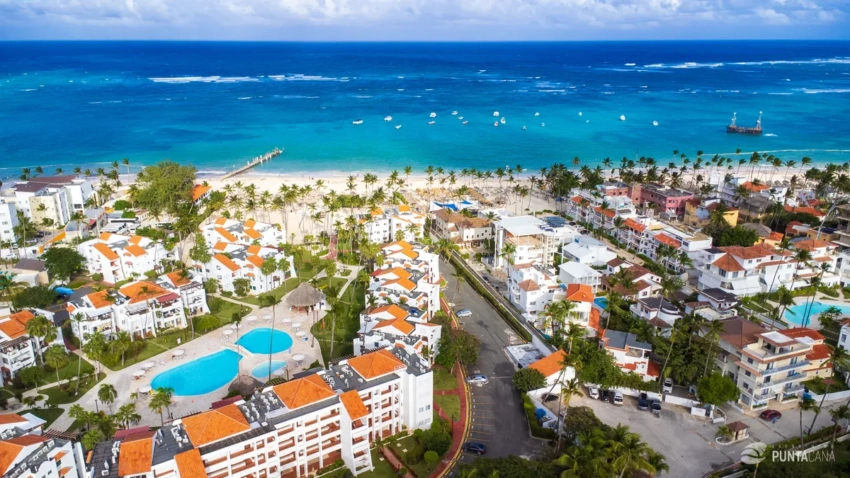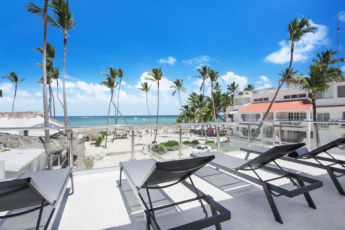How to Avoid Booking Scams in Punta Cana: Best Practices for Travelers
Understanding Common Booking Scams

How to Avoid Booking Scams in Punta Cana: Best Practices for Travelers
Navigating the vibrant travel market of Punta Cana requires vigilance and awareness, especially when it comes to avoiding booking scams. These scams can take various forms, each designed to exploit unsuspecting travelers. Understanding these common pitfalls is the first step towards safeguarding your travel plans.
1. Fake Websites and Listings
The digital landscape is teeming with opportunities, but it also hosts a myriad of deceptive schemes. Fake websites and listings are one of the most prevalent scams that target travelers. Scammers often create websites that mimic legitimate travel agencies or booking platforms, complete with professional designs and enticing offers. These sites can appear highly convincing, even to seasoned travelers.
To identify fake websites, pay attention to the URL. Scammers often use URLs that closely resemble those of reputable companies, with slight alterations such as missing letters or additional characters. Additionally, look for telltale signs like suspiciously low prices, poor grammar, and lack of contact information. Cross-referencing with trusted sources and using website verification tools can help you confirm the legitimacy of a site.
2. Phishing Emails and Calls
Phishing scams are another common threat, where scammers send emails or make phone calls posing as credible booking agencies or service providers. These communications often sound urgent and request sensitive information, such as credit card numbers or personal identification details.
To protect yourself from phishing scams, scrutinize the sender’s email address and look for inconsistencies. Legitimate companies will have official email domains, not generic ones like Gmail or Yahoo. Be cautious of unsolicited calls asking for personal information, and always verify through official company contact numbers found on legitimate websites.
3. Overpayment Schemes
Overpayment schemes are a more intricate form of scam where the scammer sends a check or makes a payment for more than the agreed amount and then requests a refund of the excess amount. The initial payment is often fraudulent, leaving you out of pocket.
To avoid falling victim to overpayment scams, never accept overpayments, and insist on receiving the exact amount. If an overpayment occurs, verify the payment’s legitimacy through your bank before making any refunds. Keeping communication transparent and documented with your bank can also provide an extra layer of security.
By becoming familiar with these common booking scams, travelers can better protect themselves and enjoy a worry-free trip to Punta Cana. Staying informed and cautious is key to ensuring that your vacation memories are filled with joy, not regret.
Researching Legitimate Booking Platforms
Ensuring you book your travel through a legitimate platform is a crucial step in safeguarding yourself from scams in Punta Cana. With a myriad of options available online, knowing how to discern authentic booking services from fraudulent ones can make all the difference in your travel experience.

Punta Cana
1. Checking Website Security
Before entering any personal or payment information on a website, it’s paramount to verify the security of the platform. A secure website is your first line of defense against potential scams.
To identify a secure website, always look for a padlock symbol in the address bar, which indicates that the site uses encryption to protect your data. Additionally, the URL should begin with https:// as opposed to the less secure http://. The ‘s’ stands for secure, highlighting that the website is equipped with an SSL certificate. This ensures that any data exchanged between you and the website is encrypted.
Beyond these indicators, it’s also advisable to check the site’s privacy policy. A legitimate platform will have a clear, accessible privacy policy detailing how your data is used and protected. If this information is missing or hard to find, consider it a red flag.
2. Reading Reviews and Ratings
Reviews and ratings can provide invaluable insights into the legitimacy and quality of a booking platform, offering you a glimpse into the experiences of previous users.
When assessing reviews, it’s important to look for consistency and authenticity. Legitimate platforms will have a mix of reviews, usually with a balanced distribution of positive and negative feedback. Beware of platforms with only glowing reviews or those with overwhelmingly negative comments. Both can be indicators of manipulated or unreliable feedback.
- Focus on platforms with a wide array of reviews across different external sites.
- Check the dates of the reviews to ensure they are recent, reflecting current service standards.
- Utilize third-party review sites like Trustpilot or the Better Business Bureau for additional verification.
3. Verifying Contact Information
A legitimate booking platform will provide clear and accessible contact information, enabling you to reach out easily with any inquiries or concerns.
First, look for a physical address, phone number, and email contact on the platform’s website. Verify that the phone number and email are functional by making a test call or sending an email. If the provided number doesn’t connect to a legitimate business or the email bounces back, consider it a warning sign.
Additionally, search the physical address on Google Maps to ensure it corresponds to a valid business location. Many scams use fake addresses or post office boxes, which can be easily identified through a quick online search.
Our Apartments for Rent in Punta Cana
Discover the charm of Punta Cana by staying in our well-reviewed apartments. These properties are verified for quality and security, ensuring you a hassle-free vacation experience. Book with confidence and enjoy the tropical paradise.

Spacious 3BR Condo in a Quiet Secure Cap Cana Residence - Private Pool, Large Terrace, Prime Marina Location
from $449 night Read more
Quiet and Cozy Family Apartments for Rent - Directly on the Bavaro Beach, Punta Cana
from $299 night Read more
Amazing Lakeview 4BR Apartment in Secure Cocotal Community, Punta Cana
from $145 night Read more
Secure & Private 2 BR Apartment for Rent in Cocotal, Punta Cana
from $109 night Read moreBy taking these steps to verify booking platforms, you can significantly reduce the risk of falling victim to scams. A little diligence goes a long way in ensuring a safe and enjoyable trip to Punta Cana.
Using Trusted Payment Methods
Choosing the right payment method is crucial in safeguarding yourself against booking scams during your Punta Cana vacation. Understanding how to utilize payment options that offer robust security can make a significant difference in your travel experience.
1. Credit Card Protections
Using a credit card for travel bookings offers substantial benefits, particularly in terms of fraud protection. Most credit card companies provide a layer of security that is not available with other payment methods. They often allow you to dispute charges if something goes wrong with your booking, offering peace of mind that your funds are safeguarded against unauthorized transactions.
A key advantage of credit cards is their chargeback mechanism. This feature enables consumers to reclaim funds in the event of fraud or service non-delivery, which can be invaluable when dealing with dubious bookings.
Moreover, many credit cards come with travel insurance benefits, such as coverage for trip cancellations or interruptions, lost luggage, and more. When selecting a credit card for travel bookings, it’s wise to choose one that offers these additional protections.
2. Avoiding Wire Transfers
Wire transfers are often used by scammers because they are like sending cash; once the money is sent, it is nearly impossible to recover. Unlike credit card transactions, wire transfers lack the protection mechanisms that could help you retrieve your funds if something goes awry.
Wire transfers should be avoided when booking travel accommodations. Instead, use payment methods that provide transaction security and the ability to dispute charges.
If a booking platform insists on a wire transfer, this should raise a red flag, prompting you to reconsider the legitimacy of the service provider. Stick to payment methods that allow for greater consumer protection, such as credit cards or trusted online payment platforms.
3. Utilizing Payment Platforms
Trusted payment platforms such as PayPal add an extra layer of security to your transactions. These platforms act as intermediaries, obscuring your financial details from the merchant. By using PayPal, you can ensure that your sensitive information is not directly shared with potentially fraudulent entities.
Comparison of Payment Methods for Booking Travel
| Payment Method | Fraud Protection | Dispute Resolution | Consumer Liability | Recovery Potential |
|---|---|---|---|---|
| Credit Cards | High | Chargeback | Low | High |
| Wire Transfers | Low | None | High | Low |
| PayPal | Medium | Dispute Process | Low | Medium |
When setting up a PayPal account, ensure that it is linked to a credit card rather than a bank account to maximize protection. This way, you benefit from the dual layer of security provided by both PayPal and the credit card issuer.
By leveraging these trusted payment methods, you can not only enjoy your trip to Punta Cana with greater peace of mind but also protect your financial interests from potential scams.
Seeking Recommendations and Referrals
One of the most effective strategies to avoid booking scams is to tap into the wealth of knowledge and experiences shared by personal networks and online communities. These resources can offer insights and recommendations that help ensure a safe and enjoyable trip to Punta Cana.

Punta Cana
1. Leveraging Social Media
Social media platforms have become invaluable tools for travelers seeking advice and recommendations. Platforms like Facebook, Instagram, and Twitter are not only places to share photos and experiences but also communities where travelers can exchange valuable information. Here’s how you can use social media effectively:
- Join Travel Groups: Facebook hosts numerous travel groups dedicated to specific destinations, including Punta Cana. Joining these groups allows you to connect with travelers who have firsthand experience and can offer trustworthy booking recommendations.
- Follow Influencers: Travel influencers often share their experiences and recommendations on accommodations and attractions. Following reputable influencers who specialize in Punta Cana can provide you with vetted options.
- Engage with Hashtags: Searching for hashtags like #PuntaCanaTravel or #PuntaCanaTips can lead you to posts and discussions that highlight both positive and negative booking experiences.
2. Consulting Travel Forums
Travel forums are online platforms where travelers congregate to discuss various aspects of travel, including booking accommodations. Websites like TripAdvisor and Lonely Planet’s Thorn Tree forum are excellent resources. Here’s why consulting these forums can be beneficial:
- Firsthand Experiences: Forums are filled with reviews and stories from travelers who have already visited Punta Cana. Their insights can alert you to scams they’ve encountered or recommend trustworthy services.
- Q&A Sections: Most forums have sections where you can ask questions and receive answers from seasoned travelers. This interaction can provide you with real-time advice tailored to your specific needs.
- Alerts and Warnings: Community members often share alerts about ongoing scams or dubious booking practices, helping you stay informed about potential pitfalls.
3. Asking for Referrals from Friends
When it comes to travel, personal referrals from friends and family are invaluable. They offer a level of trust and assurance that online reviews sometimes cannot match. Personal recommendations come from a place of genuine intent, providing you with peace of mind.
Here’s how to effectively use personal referrals:
- Direct Experience: Friends who have visited Punta Cana can share their direct experiences with accommodations and services, giving you a practical perspective on what to expect.
- Tailored Advice: Based on their understanding of your preferences and expectations, friends can offer tailored advice that aligns with your travel style.
- Trustworthy Contacts: Personal referrals can sometimes include direct contacts, such as a trusted local guide or a reliable booking agency, enhancing the authenticity and safety of your plans.
Our Best Villa Rentals in Punta Cana
Are you looking for a trustworthy and luxurious stay in Punta Cana? Our carefully curated villa rentals offer the perfect blend of comfort and security, ensuring your vacation is as seamless as it is memorable. Explore our exclusive villa options below and book with confidence.

5-Star Villa for Rent in Moroccan-Style at Casa de Campo - Large Pool, Jacuzzi & Staff
from $2621 night Read more
Luxury Villa Right on Los Corales Beach - With Heated Pool, Maid & Chef in Bávaro
from $2995 night Read more
Huge Villa for Large Groups in Bavaro (Cocotal) - Up to 16 People With Pool, Jacuzzi, Chef & Maid
from $2621 night Read more
Casa de Campo Villa for Wedding or Private Events - With Huge Lawn, Pool, Jacuzzi, Golf Cart, Chef, Butler & Maid
from $3650 night Read moreRecognizing Red Flags During the Booking Process
In the quest for the perfect vacation rental or hotel in Punta Cana, recognizing red flags during the booking process is crucial to avoid falling prey to scams. Being aware of these warning signs can save you from financial loss and ensure a safe and enjoyable travel experience.
1. Unusually Low Prices
When booking a trip to an exotic location like Punta Cana, encountering unusually low prices can be tempting. However, it’s essential to remember that prices substantially lower than the market average often indicate a scam. Scammers use this tactic to lure travelers into making hasty decisions, feigning limited-time offers or exclusive deals.
To avoid being duped by too-good-to-be-true prices, compare rates across multiple reputable platforms. If a deal is significantly cheaper, it’s wise to question its legitimacy. Furthermore, consider the cost of living and standard pricing in Punta Cana. For instance, a beachfront villa that costs a fraction of the expected price could be a red flag.
2. Pressure to Book Quickly
Another common tactic employed by scammers is creating a false sense of urgency. They might use phrases like “only one room left” or “offer expires in an hour” to pressure travelers into making rushed decisions without thorough research. This pressure to book quickly often leads to errors in judgment, increasing the risk of fraud.
To counteract this, take a step back whenever you feel rushed. Scammers rely on impulse decisions to succeed, so taking time to research the offer thoroughly can save you from potential scams. Verify the authenticity of the deal by checking reviews, contacting the property directly, and consulting reliable travel forums.
3. Lack of Detailed Information
Scammers often provide vague or insufficient information about the property or booking details. This lack of detailed information is a significant red flag. Legitimate listings typically include comprehensive descriptions, multiple high-quality images, and clear terms and conditions.
If you encounter a listing with minimal information, be cautious. Reach out to the host or booking agent to request more details. Legitimate businesses will be transparent and willing to provide additional information, including photos, videos, and specific terms related to cancellation policies and fees. If the response is evasive or unsatisfactory, it’s best to look for other options.
Red Flags in Booking Process
| Red Flag | Description | Action |
|---|---|---|
| Unusually Low Prices | Prices significantly lower than average market rates | Verify with multiple sources and question legitimacy |
| Pressure to Book Quickly | Urgent prompts to make a booking decision | Take time to research and verify the offer |
| Lack of Detailed Information | Insufficient property details and images | Request more information and verify transparency |
By being vigilant about these red flags, travelers can better protect themselves from scams and ensure a safe and enjoyable experience in Punta Cana. Always take time to verify details and trust your instincts if something feels off.
What to Do if You Fall Victim to a Scam
Falling victim to a booking scam can be both emotionally and financially distressing. However, there are effective steps you can take to mitigate the damage and help prevent others from experiencing the same fate. By understanding the necessary actions, you can swiftly respond to a scam and reduce its impact.
1. Reporting to Authorities
If you suspect that you have been scammed while booking your trip to Punta Cana, the first step is to report the incident to the appropriate authorities. This not only helps in initiating an investigation but also aids in preventing similar scams from affecting other travelers.
- Local Law Enforcement: Contact the Punta Cana police to file a report about the scam. Providing detailed information can assist in the investigation.
- Consumer Protection Agencies: Reach out to agencies such as the Federal Trade Commission (FTC) in the US. They can provide guidance and potentially take action against the fraudulent entity.
- Internet Crime Complaint Center (IC3): If the scam involved online elements, consider filing a complaint with the IC3, which partners with the FBI to tackle cybercrime.
Remember, reporting scams not only aids in your recovery process but also becomes a crucial data point for authorities to track and dismantle scam operations, protecting future travelers.
2. Contacting Your Bank
Once you have reported the scam, immediately contact your bank or financial institution. By acting quickly, you can secure your accounts and prevent further unauthorized transactions.
- Dispute Transactions: Inform your bank about the fraudulent charges and dispute them. Many banks offer zero-liability protection for unauthorized charges on credit cards.
- Freeze Accounts: Consider temporarily freezing your accounts to prevent further unauthorized access or transactions.
- Monitor Accounts: Keep a close eye on your bank statements and report any suspicious activity immediately.
Comparison of Bank Protections
| Bank | Dispute Timeframe | Fraud Liability | Additional Protections |
|---|---|---|---|
| Bank of America | 60 Days | Zero Liability | Alerts, Account Monitoring |
| Chase | 60 Days | Zero Liability | Fraud Alerts, 24/7 Support |
| Wells Fargo | 60 Days | Zero Liability | Account Alerts, Fraud Detection |
Financial institutions have robust measures to protect consumers. Utilizing these services can help recover funds and safeguard future transactions.
3. Sharing Your Experience
After taking the necessary steps to protect your finances and report the scam, consider sharing your experience. This can be an invaluable resource for other travelers and might prevent them from falling into similar traps.
- Online Travel Forums: Post about your experience on platforms such as TripAdvisor or Lonely Planet’s Thorn Tree. Your story can serve as a warning to others.
- Social Media: Use platforms like Facebook or Instagram to share your story with a wider audience. Use relevant hashtags to increase visibility.
- Review Websites: Leave reviews on the website or service where you encountered the scam. Detailed accounts can alert potential victims.
By sharing your story, you contribute to a community-driven defense against scammers, enhancing awareness and vigilance among travelers worldwide.
Frequently Asked Questions
What are common booking scams travelers face in Punta Cana?
Travelers in Punta Cana may encounter scams such as fake vacation rentals, misleading hotel advertisements, or unauthorized tour operators. Scammers might create duplicate listings of real properties at lower prices or advertise non-existent properties.
How can I verify the legitimacy of a vacation rental before booking?
To verify a vacation rental, check reviews on trusted travel sites, contact the owner directly using the contact information provided on reputable sites, and compare prices with similar properties. Consider using platforms that offer traveler protection plans.
What steps should I take to ensure a safe online booking?
- Use reputable booking websites with secure payment systems.
- Look for reviews and ratings from previous guests.
- Check for a physical address and contact information.
- Be wary of vendors requesting payment via wire transfer or unofficial methods.
Are there specific red flags to watch out for in booking ads?
Yes, be cautious of ads with prices that seem too good to be true, lack of detailed information about the property, poor-quality photos, or pressure tactics to book immediately. Also, watch out for listings without reviews or those that only accept cash payments.
How can I protect my personal and financial information when booking?
Use secure websites with HTTPS in the URL, avoid public Wi-Fi when entering sensitive information, and never share your credit card information via email. Consider using a credit card instead of a debit card for added fraud protection.
What should I do if I suspect a scam while booking?
If you suspect a scam, stop all communication with the vendor, report the listing to the hosting platform, and contact your bank to discuss protective measures. Consider filing a complaint with the local consumer protection agency.
Are there trusted resources for checking the reputation of hotels and rentals in Punta Cana?
Yes, use popular travel review websites like TripAdvisor, Yelp, or Booking.com. These platforms provide user-generated reviews and ratings, offering insights into other travelers’ experiences.
What should I do upon arriving at my booked accommodation to ensure everything is legitimate?
Upon arrival, confirm that the accommodation matches the photos and description provided during booking. Check the amenities and facilities to ensure they meet your expectations. If discrepancies arise, contact the hosting platform or property owner immediately.
How can I avoid falling for fake tour operators in Punta Cana?
Research tour operators ahead of time by checking their reviews and ratings online. Book tours through reputable travel agencies or directly through your hotel. Be cautious of street vendors offering tours at significantly lower prices.
